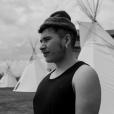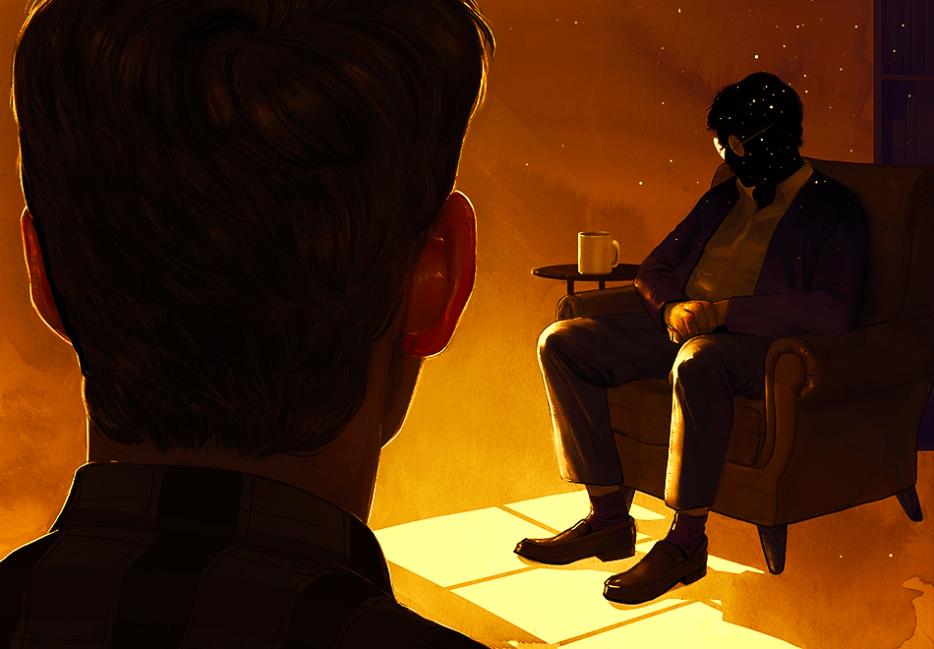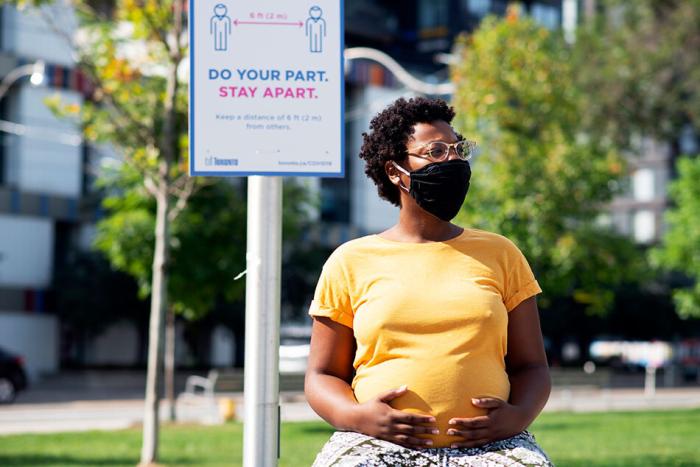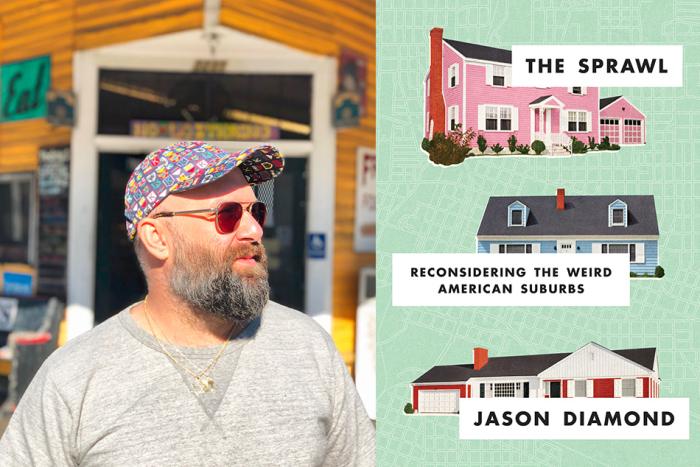It was autumn in Michael’s apartment, but August everywhere else. Noise from the neighboring units jutted through the walls like slow-motion fists. I was seated on a chair in an otherwise bare corner, facing Michael; behind him was a tiny world, none of the items in which caught my eye. Light pooled between us on the carpet. It looked like a stain. Outside, people were crying, or they weren’t.
*
I wanted to begin with an explanation, as if the body before Michael, in the shape of a bent exclamation point, were a kind of riddle. I told him I would be conducting interviews with a handful of folks from the area for a novel I intended to write: relatives, acquaintances, people of interest like him, and I hoped it would amount to an autobiography of a town, of rural Alberta. At this point Michael angled his head away from his shoulders, such that they weren’t flush anymore, then squinted. He asked how I would manage to write both an autobiography and a novel. Confidently, I said I was interested in how the emotional rhythm of a singular voice, when heard from a sociological distance, implicates a larger population, however wondrous or devastating or simultaneously wondrous and devastating. I did my best to clarify that I was suspicious of the notion that the autobiographical is an individualistic mode, that I believed every person is made up of a community’s memories. I wanted to make use of the form of the novel because it would allow me to sculpt a reality instead of photographing or duplicating one. It also guaranteed a degree of privacy and anonymity, modes through which the rawest kinds of language can surface. I wouldn’t be using voice recorders nor would I take notes, I told him, as either could introduce an aura of formality that might inhibit relatability. Veracity wasn’t the project’s primary artistic concern anyway, I had decided days ago. I was far more interested in the inestimable ways place governs the moods, atmospheres, and climates of confession and self-fabrication. Under certain conditions, I hypothesized, everyone participates in a genre of anthropological speech that breaches the fog of unknowing that, as it turns out, is also what it feels like to sputter out in the ruts of everyday life. The affective slip between stuckness and becoming alert to the force of history against one’s back was what I wanted to attune to.
I winked upon describing this framework, in fewer words, to Michael, to suggest I assumed he was following along, that he thought my logic was sound, though it occurred to me immediately thereafter that such body language could be misconstrued to my detriment. So as to disavow a tiny jolt of shame, I rushed to add that writers generally agree one must suspend belief in the factual in order to get at whatever comprises the textures and tones of selfhood, which some remain ignorant to their entire lives. I spoke by way of generalizations without fear he would cross-examine them and therefore me. Sometimes a gesture toward truth, I said, could be more powerful than a simple description of it.
Inside a moment of something like but not definitively suspense I analyzed Michael’s lips, which looked like a red smudge in the middle of a dark grey beard. It was as if someone had rubbed a wet thumb under his nose in one swift motion. His mouth seemed to be the work of a careless artist. All faces are still-drying paintings, I thought, when glimpsed from both ends of a long decade. I tried to picture Michael thirty, forty years ago. I wanted him to be beautiful, which meant I was okay making the present into something of a tragedy.
Michael had heard some of the project’s premises before, when I rang him up at work last week (he is a newspaper publisher), so I was puzzled by a vacant expression that indicated not boredom but unease. I noticed then that the sleeves of his shirt were rolled up asymmetrically, one to his elbow, the other just above his wrist. I scanned the rest of him; his hair, slicked back with water, extended from his head unevenly. His clothes hung loosely from his thin frame, as if they had just come out of the washing machine. The total effect of his appearance was that he seemed struck by a gust of wind, like someone had plucked him from the air, mid-fall, and sat him down in front of me.
Michael said there wasn’t much he could tell me that wasn’t already in print in the archives back at the office. This town isn’t a literary spectacle, he explained, though I hadn’t believed otherwise. Michael has reported on what matters to the region for most of his adult life, and what matters has often had to do with mundanities and clichés. The stories he runs repeat every year. He suspected it was buried scandals and gossip I was after, he admitted, and that if this was the case the meeting should end sooner rather than later. He said this less accusingly than decisively, crossing one leg over the other. I was, however, of the opinion that a cliché could be an anchor, that it could bind us to the world, to one another.
A group of clichés is a reason to live, I said to Michael with an enthusiasm I hoped wouldn’t embarrass him. Michael stared at me searchingly, likely turning over the sentiment in his head, investigating it for its plausibility. Was it intellectual nonsense masquerading as sympathy? Was there something more sinister beneath my performance of eagerness? Or was it something that could knot us together, if only briefly? As if deciding against the latter, Michael said irately that if I wanted him to rehash the last half century of store openings and closings, of council elections and athletic achievements, of industrial developments and petty crime, that he could have sent a digital file of his newspapers and saved me the drive up from the city.
Caught off guard by the absence of generosity in Michael’s voice I resorted to a different register, one more exacting and emotional. I told him that I was the interviewer, which made him the interviewee, a position I knew he was unfamiliar with. I didn’t see him as the place where local history was stored and nothing else. I wasn’t driven to distinguish the sayable from the unsayable so as to be controversial. I wanted to illuminate how deeply entangled the two can become. I reminded him I too called the little town home, that it tailgates me like a shadow, despite my having left a number of years ago. I could feel my language flickering, aching. For a long time it made a racket inside me as if someone were striking a rock against my ribcage, I said. I worried it would consume me, but I left when I had the chance. My voice shook as the words leapt from my mouth. I imagined I’d have to sweep up the words later. If this were the case, I continued to imagine, what if anything would a twentysomething find important enough to say to warrant making a mess?
I left so I could be as brief as any town, I added. I left so I could be as interminable too.
Silence befell us, but it was interrupted, or intensified, by the faint sound of a pop song from a car stopped at an adjacent intersection.
I watched Michael watch me. It was like I had suddenly become un-blurry to him, as if the weather between us had taken a turn. For the worst? I couldn’t yet tell. Almost imperceptibly, he nodded with unblinking, serious eyes, which I took to signify fellow-feeling, empathy, and permission to proceed, however much ambiguity had filled up the room.
I want to talk to you about regret, I said.
*
Suppose a body were trapped between two parentheses, made out to be an aside, a distraction, a trace of another narrative possibility. Would you set it free, set it loose on the world?
*
I admitted to Michael that as a teenager the sight of him had felt like a second chance. Nothing about him was conventionally gay, but he pivoted away from the codes of normative masculinity in quiet ways I embellished in my mind to represent a grace and liberty I might inherit. Where most men were a kind of noise pollution, something akin to TV static, Michael was reserved, thoughtful, calculated. Additionally, surrounded by those for whom joy was a vocation, a task yielding material consequences they felt they were owed, I was fascinated by the elegiac, non-arrogant register in which Michael inhabited the world. This is what constituted sociality for our species, I reasoned. Even his grief was a lighthouse to a boy whose future had no shape to it.
Maybe early on I determined I didn’t have to live, Michael said, in a plangent tone, I just had to be alive. It was a difference so precise I had to close my eyes to hear it. What drives a person to make that sort of compromise? he asked. A question I inferred was rhetorical, a question he had to hear himself pose, had to know was inside him all along.
Michael explained that for him there are days where all that matters is that he made it from the middle of one century to the start of another. This is because sometimes it feels like yesterday is still ahead of him. It was like someone had taken a photograph of him before he was an autonomous, thinking-feeling subject with an instant camera, the kind that immediately spits out a photograph, but it was taking years and years to develop. Not enough light had hit the surface, so he lived like negative space. By the time he caught a peak of himself, he had already faded.
What this meant is that I was a gay man listening to a gay man who hadn’t been listened to.
Why have you never formally come out? I asked.
During the summer of 1980, Michael said, I fell in love with a boy, a classmate. It happened unthinkingly, against common sense.
They had put themselves in danger. Perhaps having a “we,” however fragile, to endanger empowered them to rationalize the irrational in the first place, I thought. They would lay in his bed and hold hands until dawn, nothing else. Michael would squeeze his hand so hard it went numb, but he never protested. They seldom spoke in his bedroom, he clarified. It was as if there were things the dark made it impossible to utter. All sensory faculties fell away except touch, the language-ness of it. In the absence of speech, he told the boy everything.
I knew what he meant. What is inside a letter if not light?
They were boys who knew only how to fail at boyhood. It sounded to me like an ethnographic spectacle. They were as afraid of being found out by one another’s parents as they were of the encroaching season. There was a summerness to their little love. The sweat of June and July and August glistened in the small of their backs, is what I heard Michael saying. Did he want to put his tongue to the boy? Was he afraid it was forbidden, that it was a sheet of icy metal? Did the passage of time feel like a personal affront? Did they crane their heads toward the sky so as to believe they had transported to another world?
Without warning, Michael said, the boy disappeared. Rumour had it his parents sent him to a conversion therapy camp a few hours away. People didn’t say “gay,” Michael added, afraid it was contagious, that it would sit in the air. Michael waited for him. Michael waited as if he was put on earth to wait. When the boy finally came back, weeks later, he was no longer a person but an outline of one, no longer flush with humanity. Michael would knock at his door and no one would answer. One evening he pounded on the door until he heard sirens in the distance, until all of him turned red and blue. Days later the boy enrolled in a high school on the other end of town, so Michael moved on. It was all he knew how to do, he said. He was still someone’s child and children didn’t get to plunge into their solitude. Unless they did. The boy killed himself that winter; he used his father’s belt. That’s what Michael heard. At the funeral Michael wept and wept in the church bathroom because the truth of the death was lost in a place outside admission. He wept until he was no longer human. Like an animal, he wanted his mourning to be an enormous display.
Michael began to cry, softly—to mention a history of tears often had the effect of bringing someone to tears. I held my gaze. The thesis behind my project was that people turned into musical instruments when encouraged to testify about the conditions of their lives. My success hinged on my ability to endure whatever song was sung, so I listened with both eyes, with my hands clasped tightly in front of me.
People didn’t kill themselves, not around here, Michael continued. No one forgot.
They remembered and remembered. It triggered something powerful in him, a survival instinct. Back then, he wanted to live. He wanted to live because it was the only thing expected of him, of everyone.
My god, I didn’t want to die, Michael said with a grimace, as if the thought was a new one, as if its newness disturbed him, challenged the bedrock of his worldview. Perhaps he wasn’t ready to live differently in the wake of that sort of revelation. You know, he went on, that dead boy is more proof of my continued existence than anything else.
Do we make ourselves into tragedians trying to accrue proof of our aliveness in retrospect? I thought. Somewhere between love and loss we pitch a tent from which we only look backward.
Was it then that you decided to sublimate whatever longings you had, to live a kind of repressed life? I asked.
Yes and no, Michael answered.
It was accretive, he explained, a slow build-up of small decisions made in haste. I didn’t shun the gay parts of myself for good, if that is even possible, he said.
He always deferred the day he would get the fuck out. With age, immobility turned out to be something he didn’t have to resist anymore, it gave him context, which he thought he had irreversibly forfeited. The future stopped feeling like something solid thrashing against him.
The generations that preceded his were socialized to believe homosexuality was a crime. It was only removed from Albertan criminal law two years after he was born, in fact. The sentiment didn’t magically vanquish when reform happened. Heterosexuality was where identity began and ended. So much so that when the AIDS epidemic ravaged gay communities all over the world, the town only caught bits and pieces of the circumstances. What made its way out here, north of the last major city, north of anyone at risk, was enough to piece together an intoxicating myth of gay impurity. To be gay was to be dead, dying. Worse, to harbor the ability to kill. It became easier to clock in and out of Michael’s body than confront the heaviness of his desires. He was unsure what devastation they might wrought.
At some point, I thought, he convinced himself he was a stray bullet that silence had clenched between its teeth. Perhaps he was thankful for his captor.
Michael’s oral history reminded me of Judith Butler’s observation that we sometimes choose to stay attached to what injures us rather than gamble with what it might feel like to be in the world without the attachment. The psychological investment is so large it seems counterintuitive to relinquish it, irrespective of its consequences.
I was also reminded, perhaps un-usefully, of the story of Yellowknife’s arsenic. Let me explain. There are currently 237,000 tonnes of arsenic in the mines near the city. For decades, men hunted gold and, by extension, happiness, another world. Left unchecked, the arsenic production skyrocketed and seeped into the snow, into the surrounding environment, so it had to be locked away. Were the chemicals to escape the chambers in which they have been frozen, biological life would cease to exist. Don’t we all tell ourselves that what’s inside us, our wanting, is annihilative to this degree? Don’t we all suspect our most volatile yearnings, when freed from the pits of our stomachs, could upend a world? What if desire is one of the few forces that troubles the idea of continuums, meaning we are either entirely absorbed or wrecked by it? Don’t we all have it in us to destroy ourselves?
In response to the Butler note, Michael produced his own analogy. He mentioned the method of disembodied writing, which is when the writer is made invisible. It’s an approach he trusts, because it doesn’t paint a target on himself or his staff. It occurred to him the other day that we sometimes practice a kind of disembodied living.
Like a ghost trying to accentuate its ghostliness, he said, chuckling. It appears I have mastered the art!
To remain, I thought, to settle down, to stay put meant that the act of being inhibited, of being forestalled, became the larger ebb and flow of life writ large. Isn’t geographical fate, then, nothing but an obstacle one has to surpass? If a home was a monument to what you lost or were losing out on, wouldn’t you run away?
I felt compelled to reel Michael back into the room. To keep us both from wandering too long in the abstract. Did you ever fall in love again? I asked. At the abruptness of the question Michael turned his head away from me and toward a wall adorned with a degree and nothing else. I reminded Michael he could pass on any question that discomfited. He smiled.
Not exactly, no, he said.
Throughout the nineties he had the habit of driving down to Edmonton for weekends at a time to try to breach the prison of indecision and regret he made of himself. He would linger at the gay bar, terrified he would run into someone he knew—which never happened, he clarified— until one or two in the morning. All he wanted was to be seen in a place where exposure was a kind of currency rather than a death wish. Men made advances, most of which he rebuffed. He accepted a blowjob here and there in bathroom stalls but no one had names, including him. He thought about staying in Edmonton, but in the end he had lost the power to be anything but complacent, self-sacrificial. Most importantly, though, even in his thirties and forties, he felt haunted by his first, and only, love, and the thing about memory is you can’t extinguish it. It is as automatic as the spinning earth. He decided it would be wrong to not be as close to that history as possible, as if it were a dying language only he could speak. His love for the boy was so contested and fraught and tragic he is still awash in it. The emotional intensity was enough to last a lifetime.
Is that bizarre? Michael asked. That such a brief experience of love was too much?
For a second or two I thought Michael expected an answer from me. His eyes were pleading, but whose wouldn’t be? Who wouldn’t bruise themselves in the drama of self-documentation? How could anyone hold such a jagged memory up to the light and not wince?
I decided against letting the interview naturally dissipate and asked Michael if he had ever felt empty, like something vital was missing, to which he said emptiness wasn’t something to run from. We all begin with emptiness, he argued: an empty name, an empty house, an empty life.
Mine is a life of beginnings, he said. Every morning I start over.
I explained to Michael that I experienced emptiness in two ways: either it was an echo from the past boomeranging around a room or it was the sound of air plummeting to the ground upon being sliced through. In both cases, around me it rained emptiness. I would be drenched in it.
Perhaps that is a good way to understand our generational differences, Michael said, with an air of self-satisfaction.
Michael, without prompt, said he doesn’t nauseate on what his life could have been. It’s his small act of refusal, his silent rebellion. Maybe when he looks in the mirror, he see who he is, which is someone who’s running out of time. All those years of evading death were preparatory. Without knowing it, he was practicing death, a ritual unto itself. Just then he closed his eyes, not in an effort to abate tears but as if succumbing to exhaustion. So I did too. For a short while we were alone in a shared world where nothing needed to be said to grasp one another’s emotional possibility.
*
Michael walked me to the elevator and then to the front entrance. I thanked him for his time, for his candor and vulnerability, to which he said it was nice to get things off his chest, that I could follow-up if need be, that I knew where to find him. At the edge of the parking lot, I turned back to get one last look at him. Because it was five o’clock and the sun gave him a new face, or because I was twenty-four and lonely in a town that made me feel like a shipwreck, I wanted to kiss him. Instead, I said goodbye for a second time.
Now, alone in a hotel room, it’s as if I can still hear desire clamouring inside Michael. It’s like a bird’s wings rattling against a cage. It’s a beautiful and terrible melody I suspect he will die to.






